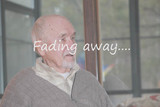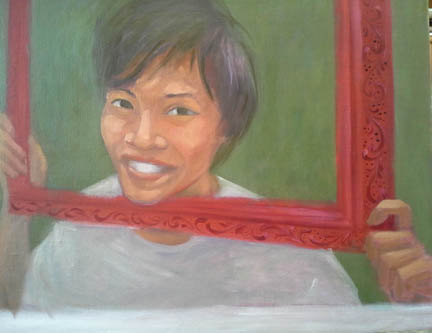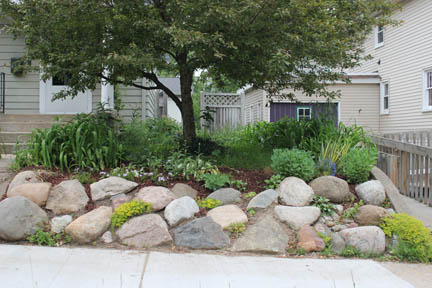 The other evening, my husband and I were driving together. It’s rare these days to have a moment of privacy so I took the opportunity to ask him how he was doing. At first he gave me the standard, “Fine” answer but I dug deeper. With all that’s coming at us with Mom in rehab and trying to keep Dad safe on his own, work and the daily situations of life like car repair, I wanted to know what was really on his heart. “No,” I said. “How are you really doing? How are you handling all that’s coming at you right now?” He looked ahead and sighed. “I feel as if I’m watching a train wreck in slow motion and there’s nothing I can do to stop it,” he said. Tears welled up in my eyes and I reached over for his hand. There was nothing I could say. It was an apt description of watching a parent succumb to Alzheimer’s. Meanwhile, across town, a friend of mine was coming home after being at the hospital all day with her mother. She was exhausted, developing a sore throat and deeply discouraged. Her mother had driven into a tree in the parking lot of her apartment complex. She had a broken nose, the front end of the car was a mess but she had no recollection of the accident. She doesn’t understand why everyone keeps telling her her memory isn’t good, nor why they want her to stop driving. In yet another part of town, a niece was trying to spend time recollecting with her confused uncle who had severely broken a hip after a fall and would pass away a couple days later, leaving a wife who also has dementia. And on it goes. I could tell you about an aunt who lives in Texas and was found in Oklahoma after driving for a day and a half, forgetting where she was going, or the woman who left her apartment in Ohio on foot, trying to find her house in Chicago. She hadn’t lived there in over fifty years. Currently, there are over 5 million people in America with Alzheimer’s and each of them have a story. Their story, in turn, ripples out to touch others. Millions of people are involved with either developing this disease or caring for someone with it. Dementia is taking a huge toll on individuals, families, communities and the nation. And yet, a chronic underinvestment in Alzheimer’s research persists. If you are interested in advocating for more funding for a disease that none of us is safe from, please consider writing your representative. You can go to https://act.alz.org/site/Advocacy?cmd=display&page=UserAction&id=1295 to fill out a form urging action. Surgery was successful, I'm happy to report. My leg is sore, but getting better every day. I'll spare you a photo of the scars. I've been on pain meds most the week and feeling a bit disconnected, so I'll also spare you my writing.
However, you may be interested in a new documentary being made about the relationship between dementia and food choices. It's called Bread Head. You can find information about it at the following link - just copy and paste it into your browser: https://www.kickstarter.com/projects/maxlugavere/bread-head-can-we-prevent-americas-most-feared-dis The young filmmaker says, "This is not another documentary exposing the hardships of dementia. There are plenty of those.BREAD HEAD (working title) will be the first documentary to investigate the empowering science that is happening in labs and clinics today to help us beat it. Because changes in the brain begin decades before Alzheimer's symptoms, the absolute best way we can move the needle on this disease is through minimizing risk when it matters most." I thought I'd share this with you in case you are interested in his film and in helping him out.  When I took my mother to a neurologist to get a complete workup on her memory issues, the diagnosis came with a thud. Alzheimer’s. While Mom sat there unfazed, I was left feeling hollow inside as a variety of emotions fought for control. The doctor looked at me and said rather casually, “You have nothing to worry about. This isn’t the hereditary kind.” Nothing to worry about. Is that so? When Mom was diagnosed, the numbers showed that one in twelve adults were developing some sort of dementia. Over ten years later the numbers are now one in six. It may not be hereditary, but there is certainly an epidemic happening that can affect anyone. I have long suspected that something is up environmentally or behaviorally that is causing the increase in the occurrence of Alzheimer’s. In 2005, a study by Susanne de la Monte's group at Brown University in Providence, Rhode Island, identified a reason why people with type 2 diabetes had a higher risk of developing Alzheimer's. In this kind of dementia, the hippocampus, a part of the brain involved in learning and memory, seemed to be insensitive to insulin. Not only could your liver, muscle and fat cells be "diabetic" but so it seemed, could your brain. Feeding animals a diet designed to give them type 2 diabetes leaves their brains riddled with insoluble plaques of a protein called beta-amyloid – one of the calling cards of Alzheimer's. Scientists also know that insulin plays a key role in memory. Taken together, the findings suggest that Alzheimer's might be caused by a type of brain diabetes. When I heard of this study it felt that my suspicions were confirmed. Because my mother and now my father-in-law developed dementia, I find myself trying to keep up with the latest research on the problem. There is very exciting news that has come out on a study that actually reversed memory loss. Dr. Dale Bredesen has had a very promising results with ten patients who had been diagnosed with Alzheimer’s disease. Of the ten, nine had their dementia reversed. The tenth was actually in late stages of the disease. The doctor is optimistic but does warn that the results are anecdotal and a more controlled clinical trial is needed. Still, it is an interesting and encouraging approach. He has developed a protocol and personalizes it to each patient. In one patient, the program called for a gluten free diet with increased vegetables, fruits and non-farmed fish, stress reduction, taking melatonin at night, getting eight hours of sleep each night, optimizing oral hygiene, fasting 12 hours between dinner and breakfast and for a minimum of three hours between dinner and bedtime, and exercise. Another patient added coconut oil, probiotics and turmeric to the mix. If you are interested in reading the paper, you can find it here: http://impactaging.com/papers/v6/n9/full/100690.html Be warned, it is pretty technical, but if you scroll down to the case studies you’ll see more of the protocols followed. I look forward to hearing more about this research. In the meantime, I’m looking at my own lifestyle and seeing where I can improve my health habits. Dental floss, anyone? Sorry about the link. It should be working now.
|
Archives
July 2021
Donna KemperDonna Kemper put aside her art career to care for a mother she hadn't seen in over a decade. For seven years she followed her mother's journey into dementia, caring for her and putting forgiveness into action. Categories
All
|





 RSS Feed
RSS Feed